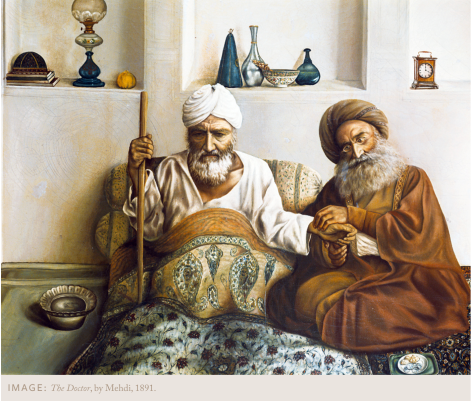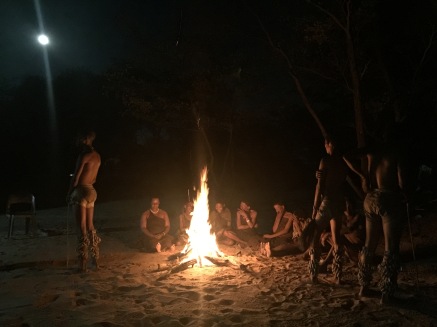
Nom de guerre: Al-Hakim the Bushman
Al-Hakim: The history of our species is one of migrations. Over the past 300,000 we have dispersed from our roots in Eastern Africa to inhabit every landmass on the planet. Historically, few places are more intimately linked to movement and mobility than Central Asia. Waves of migrations and crisscrossed trade routes connected large parts of modern-day Europe, the Middle East, and Northern Africa to the Indian Subcontinent and China. In these lands, the life of mind intersected with the life of trade, material and non-material cultures of the ‘west’ interacted with the cultures of the ‘east.’ Central Asia was not only a melting point of people and things but also a cauldron of ideas and philosophies. In these historical civilizations, a physician was referred to as an ‘Hakim.’ Although these hakim’s practiced medicine, they were also philosophers and scientists. The word hakim became synonymous with “the wise,” or “practitioner of wisdom.” They focused attention not exclusively on the specifics of one field or another but on knowledge itself, and the paths of its attainment. Polymaths such as Ibn-Sina, al-Biruni, al-Razi, Omar Khayyam mixed, matched, synthesized, and integrated vast domains of knowledge utilizing the rich breadth of epistemologies available to them in order to develop comprehensive, unique, and original explanations of the world. In short, they leveraged their position at the crossroads of ancient Greek and Indian civilizations to leave an indelible mark on human learning.
Bushman: The “bushman” metaphor is in homage to these ancient people of Namibia and Botswana. These hunters and gatherers pursued a way of life that was until very recently (~10,000 years) the norm for our species. They lived in small bands and thrived for thousands of millennia by hunting and foraging. Their communities had a social structure that reinforced a deep egalitarianism between each other. Moreover, they lived as interwoven members of nature with deep bonds and confidence in the gifts of nature.  Although they possessed a limited material culture they thrived in a dynamic equilibrium with the harsh ecosystem of the Namib desert for 100,000 years. Anthropologists characterized them as the “original affluent society” and their economic approach is termed “primitive affluence.” As the anthropologist James Suzman documents in his book, the Abundance Without Affluence, the Bushmen culture withstood the uncertainties of time, coped with periods of relative scarcity, and mastered the art of living in the moment. They possessed a physicality, adaptability, and robustness that enabled that success. There is undoubtedly a “hunter-gatherer in all of us” and our yearning for freedom, equality, and “nature” is a testament to that disposition.
Although they possessed a limited material culture they thrived in a dynamic equilibrium with the harsh ecosystem of the Namib desert for 100,000 years. Anthropologists characterized them as the “original affluent society” and their economic approach is termed “primitive affluence.” As the anthropologist James Suzman documents in his book, the Abundance Without Affluence, the Bushmen culture withstood the uncertainties of time, coped with periods of relative scarcity, and mastered the art of living in the moment. They possessed a physicality, adaptability, and robustness that enabled that success. There is undoubtedly a “hunter-gatherer in all of us” and our yearning for freedom, equality, and “nature” is a testament to that disposition.
I too am a product of cultural, historical, and intellectual crossroads. My grandfather traveled the ‘Silk Roads’ between northern India and Iran. My father migrated from India to the United States. I take inspiration from the legacy of the hakim’s and aspire to be a lifelong learner. I am professionally and educationally itinerant with training as an emergency physician, medical informaticist, and an MBA. I am an autodidact with wide-ranging interests that extend from history, anthropology, and evolutionary biology to information science, data science, and epistemology. I am also inspired from our species-wide “Bushman” past and look to live my life in deference to the unknown and the unknowable. As James Carse writes, “To be prepared for surprise is to be trained. To be prepared to be surprised is to be educated.” The ancient Greek philosophers introduced the concept of eudaimonia, which loosely translates to a “flourishing life.” A eudaimonic life was the goal and they prescribed a course of action to achieve this state. A eudaimonic life is not the result of “hedonistic, lotus-eating approach to life…[it] requires determination and discipline.” The best chance of achieving eudaimonia is to “embrace of beauty and pursuit of pleasure – pleasure not as sensual debauchery but as the sense of well-being embodied in living justly and lovingly in a generosity of spirit.” I derive pleasure from learning, I see beauty in processes and will use this website as an expression of that pursuit and vision.
Hi Dr. Kohli, I’m so glad your comment on the NYTimes article about Iora Health led me to your blog! My network includes several bioinformatics experts who share your views and are developing and implementing solutions in low-resource settings both domestically and in the developing world. You’d be in good company! I hope you’ll be in touch. Best, Terry